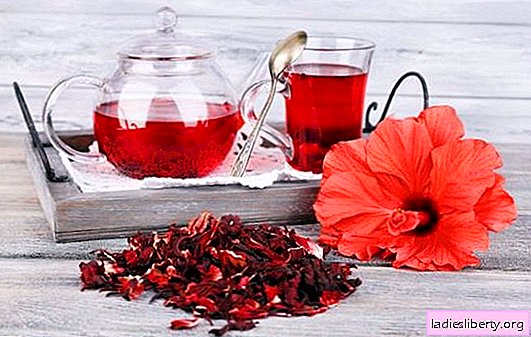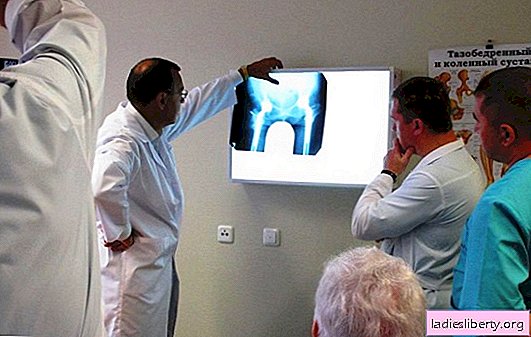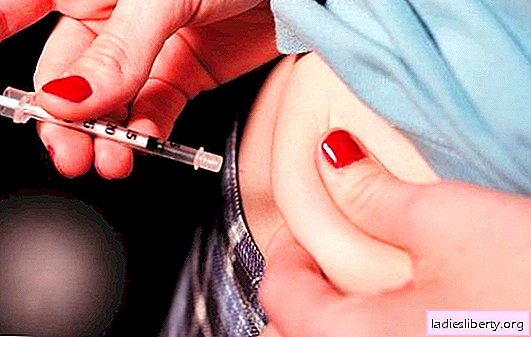
A ruby drink with a bright taste, hibiscus, brewed from Sudanese roses, whose beneficial properties affect perhaps all spheres of human health. But it is still important to take into account the peculiarities of the use of this herbal tea so that there is no harm from it.
What is hibiscus and what explains the benefits of Sudanese roses
Sudanese rose is a shrub, also known as Venetian mallow, rosella, pharaohs flower, hibiscus sabdariffa. They appreciate it for large, wide-open flower cups, usually scarlet, but there are also plant forms with flowers pink, white, orange and yellow.
Of these, brewed herbal tea called hibiscus.
India is considered the birthplace of a tropical plant, but over four millennia ago it was already known on the lands of Southeast Asia and North Africa.
And today, in the countries of the latter, hibiscus enters into national cuisines - flowers are added to salads, stews, allowed for jams and sweets ... But tea comes first.
It is noteworthy that various drinks are obtained from regional forms of the plant. For example, hibiscus from Thailand is sweetish and dark garnet, and from Mexico - brackish and orange. We usually find one with a fruity taste with a pleasant acidity, delicate aroma and ruby transparency of color from red flowers.
Hibiscus is drunk hot and cold with ice cubes, just like that with the addition of sugar, honey and lemon, spices (cinnamon, ginger, vanilla). In its pure form and as part of herbal teas.
Despite the pleasant acidity, the drink does not have oxalic acid at all, so there will be no harm from the Sudanese rose for kidney diseases, and due to the mild diuretic effect, it will be more useful.
Of the 13 amino acids present in the plant, 6 belong to the indispensable ones, and their entire spectrum is involved in protein synthesis, which is especially important during fitness classes and when you need to build muscle.
Flavonoid quercetin has a beneficial effect on the eyes - it strengthens eyesight and protects the retina from overloads as a result of prolonged reading or being behind a computer monitor.
The vitamin series is most clearly represented by vitamin C, in which hibiscus is superior to orange, as well as vitamin P. The latter is not synthesized by the human body, so it is very important to have its sources on the table. It is found in Sudanese rose no less than in blackcurrant and rosehip.
In hibiscus, not only infusion is useful, but also tea leaves - the pectin contained in them absorbs and removes harmful substances from the body, including salts of heavy metals.
Of the class of omega-6 fatty acids in hibiscus, the properties of linoleic acid, which are involved in the following, are most pronounced:
regulating blood cholesterol levels, preventing the formation and breakdown of existing cholesterol plaques;
regulation of hormone levels;
accelerating lipid metabolism and preventing the conversion of excess energy (entering the body with food) into body fat;
Also, linoleic acid is involved in the breakdown of excess fats resulting from physical activity, diet and cosmetic procedures (for example, wraps with kelp for weight loss).
Of the fruit acids, citric is most clearly represented in high content, which positively affects the processes of cell renewal and facial skin improvement - narrowing of pores, matting tone, and the disappearance of freckles.
Saturated with antioxidant properties, in principle, Hibiscus is known as a rejuvenating "elixir", popularized back in the days of Avicenna.
What diseases and disorders is Sudanese rose especially useful for?
The amazing properties of hibiscus in relation to blood pressure. Being drunk cold, the drink gently reduces it, and hot - increases.
Drinking Sudanese roses can be a prophylactic when there is a risk of an allergic reaction to any product or medicine, you can also advise them to treat them an hour before the upcoming trip by car (if it painfully crashes in it).
A cup of hibiscus infusion stimulates appetite before eating, and drunk 15-30 minutes after it removes the feeling of heaviness in the stomach if there was something heavy and greasy on the table.
Hibiscus can be called the best tea for a vacation - it will facilitate the processes of acclimatization and getting used to changing time zones, increase the resistance of the stomach to the innovations of local cuisine, and help to get an even, beautiful tan without sunburn.
In summer, hibiscus perfectly quenches thirst and refreshes, even if you drink it hot.
By the way, it is also possible to cook sorbet based on it (a dessert like ice cream).
In cold weather, the drink warms and relaxes, and with it there are many recipes for punch.
Also, it maintains immunity against seasonal infections characterized by a runny nose and a sore throat, and if the virus still defeats it, it alleviates the symptoms and reduces the fever.
Also, the benefits of Sudanese rose are obvious in the following:
the fight against overweight - due to the acceleration of metabolism and a delicate laxative effect;
diabetes mellitus - due to a decrease in blood glucose levels;
heart diseases - potassium and sodium as part of hibiscus are involved in the work of the heart muscle;
Hibiscus is recommended for women to alleviate premenstrual syndrome, normalize cycle disorders and in the treatment of gynecological diseases.
The benefits of Sudanese rose for the nervous system
Whether you need to calm down after the stress experienced, relax and tune in to rest in the evening of a difficult day, or focus on the eve of serious work - a cup of hibiscus will be equally useful.
The fact is that the complex of biologically active substances in it has pronounced properties of regulating the central nervous system of a person and bringing it into an optimal state, which can be changed at the level of deep brain activity depending on the needs arising in the environment.
Thus, hibiscus can be recommended for:
normalization of the sleep and wake cycle;
getting rid of symptoms of chronic fatigue;
protecting the body from increased emotional stress;
memory improvements and faster reactions;
treatment of neurotic diseases.
What could be the harm from Sudanese roses
If Sudanese rose is completely new, it’s worth starting with a small portion of the drink - an individual allergic reaction is possible. But this is extremely rare.
Children can enjoy a drink from hibiscus from the age of three, but then again - a little bit and the weakest brewing.
It is believed that in the absence of contraindications and individual intolerance, you can not feel the harm of Sudanese roses, if you do not exceed the rate of use of hibiscus for an adult - up to 1 liter per day. Abuse also leads to excessive stress on the kidneys, and also on the stomach, because hibiscus increases its acidity.
For this reason, it is not recommended to drink hibiscus for diseases of the stomach, accompanied by its increased acidity.
Also, you should not drink hibiscus with urolithiasis and cholelithiasis without the permission of the attending physician.
Despite the fact that hibiscus has a beneficial effect on the oral cavity (disinfects, reduces bleeding gums), it is better to rinse it with clean water after it - prolonged exposure to acids from Sudanese roses destroys tooth enamel.
There will be no harm from the Sudanese rose, but its beneficial properties will significantly decrease if you brew a drink with boiling water or use metal dishes for this - only porcelain or glass is suitable.
Also, hibiscus is not addictive, but with constant use, the body reacts less and less to a number of its properties, for example, it is not so good at tones up and stimulates appetite. Therefore, it is reasonable sometimes for a week or two to reduce the consumption of Sudanese roses or completely abandon it in order to then return to its refreshed benefits.











